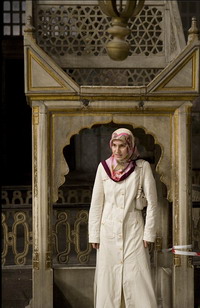Turkish prime minister stands for removal of headscarf ban
Ban on women wearing headscarves in universities can be lifted, meaning that the government is moving to foist a Muslim agenda on the nation.

Recep Tayyip Erdogan statement at a news conference that he wants a constitutional change to remove the ban comes just weeks after he scored a major political triumph: the election of his close ally Abdullah Gul - a devout Muslim - as Turkey's president.
The opposition had vehemently opposed Erdogan's choice of Gul for the influential and highly symbolic post, saying it would open the way for the government to carry out a hidden Islamic agenda.
Erdogan's comments Wednesday will raise suspicions that he is taking the first step in that direction, particularly because it was a tempest over the headscarf worn by Gul's wife that galvanized opposition to the former foreign minister's presidential bid.
Secularists were appalled that a headscarf clad-first lady would enter the presidential palace occupied by Turkey's founding father Mustafa Kemal Ataturk - and they waged an unsuccessful four-month battle to block Gul's election.
Erdogan insists that lifting the headscarf ban is merely a question of individual liberty.
"We are talking about freedoms," he said Wednesday.
Erdogan had been previously reluctant to openly state his intentions about the headscarf ban. When asked about the issue before general elections in July, he skirted the issue by simply affirming his loyalty to personal freedom.
However, soon after the elections, Erdogan's Islamic-oriented Justice and Development Party formed a group of legislators and scholars to write a new Constitution that will replace the current one, written during military rule following a coup in 1980.
A copy of the first draft published by Turkish media includes alternative wordings for a possible article that would allow the Islamic headscarf to be worn on campuses.
"The right to higher education cannot be restricted because of what a girl wears. There is no such problem in Western societies but there is a problem in Turkey and I believe it is the first duty of those in politics to solve this problem," Erdogan was quoted as saying by the Financial Times on Wednesday.
But Turkey's secular elite fears that lifting the headscarf ban will have a snowball effect - putting pressure on women to wear ever more conservative attire and opening new avenues for the government to impose Islam on public and private life.
The head of Turkey's Higher Education Board - a well-known secularist law scholar - condemned Erdogan's move to life the headscarf ban.
"It is our mission to remind the public that any constitutional regulation that would abolish restrictions on clothing is illegal," said Erdogan Tezic.
A key factor in the new headscarf debate is how the military will react. Turkey's generals see themselves as the upholders of the nation's secular traditions and have not hesitated in the past to stage coups to protect them.
When Erdogan first proposed Gul for president in April, the military issued a statement that hinted at military intervention. The ensuing crisis forced Erdogan to call an early general election. The ruling party's landslide victory resurrected Gul's presidential bid and parliament voted him into the post on on Aug. 28.
The wearing of headscarves in universities was first banned shortly after a 1980 military coup by officers who viewed Islamists as a serious threat. But the implementation of that rule varied during the law's early years.
In 1997, a coalition government run by an Islamist party was ousted after a conflict with staunchly secular institutions, including the military, which feared that Turkey's leaders were undermining the secular principles protected by the constitution.
Then, entering a university campus wearing an Islamic headscarf was prohibited. Another law prohibited "covered" women from working in government offices.
Subscribe to Pravda.Ru Telegram channel, Facebook, RSS!


